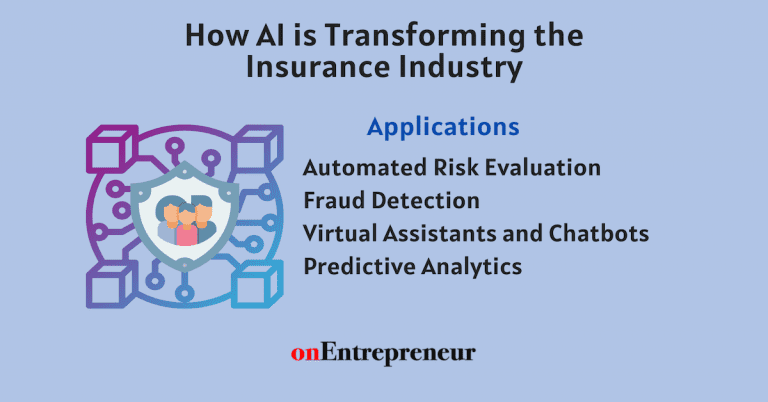The insurance industry, known for providing stability and helping reduce risk, is now going through major changes due to artificial intelligence (AI). AI is bringing big changes to how insurance companies work. By revolutionizing underwriting, claims, customer service, and judging risk levels, AI offers new ways to be efficient, accurate, and personalized.
According to research, AI in the insurance market was valued at $2.74 billion in 2021 but is forecast to soar to $45.74 billion by 2031, growing at a CAGR of 32.56% from 2022 to 2031.
AI’s skills like processing language, automation, chatbots, and virtual assistants aid in underwriting, policies, responsive service, and more.
With AI’s data-driven insights, policies can be more personalized and resilient.
“As brokers increasingly adopt AI, it’s clear this technology will redefine insurance as we know it. It helps address the unique risks faced by people, businesses, and communities. The future is data-driven, and it’s already here”, says Bruce Rabik, Chief Operating Officer of CCV Insurance (https://www.ccvinsurance.com). He also highlights that the use of predictive AI technology has allowed them to offer innovative and tailored solutions, putting their customers first.
Types of AI Applicable in the Insurance Industry
1. Machine Learning
AI uses machine learning algorithms to analyze historical data and identify patterns, correlations, and trends that humans might overlook. In the domain of insurance, by recognizing patterns related to risk, fraud, customer behavior, and claims management, insurers can make more precise underwriting decisions, automate repetitive tasks, and optimize pricing strategies.
2. Conversational AI
With the recent breakthrough in Generative AI by OpenAI, natural language conversations (Conversational AI) are now much more accessible to general users. Insurance companies can either train their own models or use existing APIs to integrate AI-powered virtual assistants to handle basic inquiries, guide customers through the insurance purchasing process, and provide personalized recommendations promptly.
3. Robotic Process Automation
Another use of AI technology for insurance companies is Robotic Process Automation (RPA). Using bots to automate repetitive tasks streamlines back-office work like data entry and policy administration. This improves efficiency, reduces errors, and lets human employees focus on complex, value-added activities. Bots handle routine work so staff can apply their skills to analytical thinking. Insurance companies increasingly use bots to operate faster and smarter.
AI’s Applications in Insurance
As we discussed above, AI has numerous applications in insurance, and applications are growing day by day with new research and innovation. It’s not necessary to utilize AI tools and applications in every task, but usage is becoming more mainstream as AI evolves.
1. Automated Risk Evaluation
Machine learning algorithms quickly analyze data to enable more accurate, customized risk assessments and pricing. This streamlines underwriting.
2. Fraud Detection
AI analyzes large data sets to identify suspicious patterns that may indicate fraud. This allows insurers to better investigate and mitigate fraud.
3. Virtual Assistants and Chatbots
AI powers tools that provide instant customer service through natural conversations. This improves the customer experience.
4. Predictive Analytics
By analyzing customer data, AI identifies trends and anticipates needs. This allows insurers to offer personalized, targeted products.
In summary, Artificial Intelligence (AI) is transforming insurance through automation, advanced analytics, and improved customer service. Key applications include underwriting, risk evaluation, fraud prevention, and personalized offerings. As AI evolves, its insurance applications will continue expanding.



